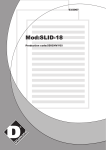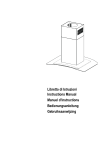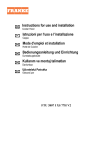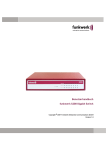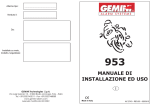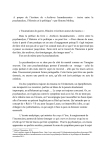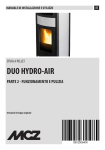Download fitting instruction bridge 8100
Transcript
MANUALE INSTALLAZIONE BRIDGE 8100 FITTING INSTRUCTION BRIDGE 8100 DELTA ELETTRONICA s.p.a. via Astico 41 - 21100 VARESE - ITALY www.cobra.it 06DE1425B 10/00 sgn1425A.p65 1 03/10/00, 16.29 CERTIFICATO DI INSTALLAZIONE INSTALLATION CERTIFICATE Kit CONTENUTO DEL KIT 8188 KIT CONTENTS Il sottoscritto, installatore, certifica di aver eseguito personalmente l'installazione del dispositivo di allarme del veicolo descritto qui di seguito, conformemente alle istruzioni del fabbricante. I undersigned, professional installer, certify that the installation of the vehicle alarm system described below has been carried out by myself pursuant to the mounting instruction supplied by the manufacturer on the system. 8168 INFORMAZIONI INSTALLAZIONE INSTALLATION DETAILS INSTALLATORE / FITTING CENTER A/c NO. INDIRIZZO / ADDRESS 8168 8115 CODICE POSTALE /POST CODE TEL. NO. DATA D'INSTALLAZIONE INSTALLATION DATE DESCRIZIONE PRODOTTO PRODUCT DESCRIPTION MARCA / MAKE TIPO / TYPE NUMERO DI OMOLOGAZIONE / APPROVAL NUMBER DATA DATE FIRMA / SIGNATURE INFORMAZIONI VEICOLO VEHICLE DETAILS MARCA / MAKE CHASSIS NO. MODELLO / MODEL TARGA / REG. NO. INFORMAZIONI CLIENTE / PROPRIETARIO VEICOLO CUSTOMER DETAILS / VEHICLE OWNER NOME / NAME COGNOME / SURNAME INDIRIZZO /ADDRESS CODICE POSTALE /POST CODE TEL. NO. CONTROLLI ANNUALI DEL SISTEMA ANNUAL SYSTEM HEALTH CHECK DATA DATE INSTALLATORE FITTING CENTER A/c NO. DATA DATE INSTALLATORE FITTING CENTER A/c NO. DATA DATE INSTALLATORE FITTING CENTER A/c NO. 2 MANUALE INSTALLAZIONE sgn1425A.p65 2 BRIDGE 03/10/00, 16.29 CARATTERISTICHE TECNICHE DEL SISTEMA Tensione di alimentazione nominale 12VDC Tensione di esercizio 9/16VDC Consumo per configurazione standard (allarme con sensore ultrasuoni, modulo arresto motore e LED) a 12 VDC - disinserito < 10 mA - inserito < 14 mA Temperatura d’esercizio -40/+85 °C Potenza acustica >118 dB(A) a 1 m 12V Code INTRODUZIONE SYSTEM TECHNICAL SPECIFICATIONS Rated supply voltage 12VDC Operation supply voltage 9/16VDC Consumption by standard configuration (alarm with ultrasonic sensor, engine cut-off and LED) at 12 VDC - disarmed < 10 mA - armed < 14 mA Operating temperature -40/+85 °C Acoustic power >118 dB(A) at 1 m Questo manuale contiene tutte le imformazioni relative alle operazioni che sono richieste per installare il sistema di allarme e per configurarlo come richiesto dal cliente e/o dalle disposizioni normative del Vostro Paese. La descrizione di funzionamento delle singole funzioni è riportata nel manuale utente, mentre in questo manuale sono riportate alcune note cui fare riferimento durante l’installazione. DESCRIZIONE DELLE FUNZIONI • • • Il sistema é conforme alle seguenti regolamentazioni: The system conforms to the following regulations: • DIRETTIVE EUROPEE / EUROPEAN DIRECTIVES • Commission Directive 95/56/EC of 8 November 1995 Commission Directive 95/54/EC of 31 October 1995 Commission Directive 89/336/EEC of 3 May 1989 • • • • • • • CAPITOLATI ASSICURATIVI / INSURANCE SPECIFICATIONS THATCHAM SRA Inserimento/Disinserimento per mezzo di radiocomandi a codice dinamico. Protezione volumetrica dell’abitacolo con sensore ad ultrasuoni che non necessita di regolazioni della sensibilità. Protezione perimetrica. Ad allarme inserito, dopo 40 sec., la sirena suona se una porta, il cofano o il baule viene aperto. Protezione da tentativi di avviamento. Ad allarme inserito il motore è bloccato ed il tentativo di avviamento, trascorsi 40 secondi, genera un allarme. Quando si verifica un allarme la sirena suona per 30 secondi e gli indicatori di direzione lampeggiano. Comando del sistema originale di chiusura centralizzata di porte e baule. Led di indicazione dello stato del sistema con funzione di memoria avvenuti allarmi. Un circuito di sicurezza impedisce l’inserimento del sistema a motore in moto. Allarme panico. Esclusione ultrasuoni e/o di un eventuale sensore esterno. Autoapprendimento di radiocomandi e chiavi elettroniche. Chiavi elettroniche di emergenza. NORMATIVE INTERNAZIONALI / INTERNATIONAL NORMATIVES IEC 839 - 10 - 1 - Alarm systems for road vehicles 12 - 1995 26 3 FITTING INSTRUCTION sgn1425A.p65 3 BRIDGE 8100 BRIDGE 8100 MANUALE INSTALLAZIONE 03/10/00, 16.29 FUNZIONALITA’ DEI TASTI DEL RADIOCOMANDO Tasto A: Tasto B: inserisce/disinserisce l’allarme e l’immmobilizzatore, consente l’accesso alla programmazione, incrementa il volume del buzzer e seleziona la linea nelle tabelle di programmazione. attiva/disattiva allarme panico, disattiva l’immobilizzatore, esclude l’ingresso volumetrico e l’ingresso sensori supplementari, riduce il volume del buzzer e attiva la funzione nelle tabelle di programmazione. VOLUMETRIC AND PERIMETRAL PROTECTION FUNCTIONAL TEST Carry out the test operations in the indicated sequence after having shut the doors, bonnet and boot. The test operations must be carried out within the 40 second inhibition phase. An alarm status will be generated (siren and blinker) once this time has elapsed. ATTENZIONE ! Questo prodotto é configurato per soddisfare i requisiti della Direttiva Europea per i sistemi di allarme. L’utilizzo della funzione buzzer é consentita solo per i mercati extraeuropei. L’attivazione invalida l’omologazione. Prima di iniziare l’installazione scollegare il cavo negativo dalla batteria e ricollegarlo solo ad installazione ultimata. Questo sistema é compatibile con veicoli a motore che abbiano batteria a 12 V con negativo a massa. ONLY FOR ULTRASONIC VERSIONS FOR ALL VERSIONS PERIMETRAL PROTECTION TEST mod. 7777 A B Arm the alarm by pressing button ’A’. Make sure that there is nothing able to move in the passenger compartment. Shut the doors, bonnet and boot, keeping 2 windows on the same side lowered about 10 centimeters. Insert a hand into the vehicle and wave it about on a level with the front seat headrest. If the LED starts blinking quickly the sensor is working properly Disarm the alarm by pressing button ’A’ and close the windows. Arm the alarm by pressing button ’A’ and hit the windows with the fist.The LED has to go on blinking in the same way. 4 Open a door with the key. The buzzer will issue a continuous sound. The signal will cease when the door is closed. Repeat the test for the other connected doors, the bonnet and boot. Disarm the alarm by pressing ’A’ on the radio control. The turn indicators will blink once. The doors will unlock and the led will go out. 25 MANUALE INSTALLAZIONE sgn1425A.p65 Arm the alarm by pressing ’A’. The turn indicators will blink twice. The doors will lock. The led will flash. 4 BRIDGE BRIDGE 8100 FITTING INSTRUCTION 03/10/00, 16.29 POSIZIONAMENTO DEGLI ELEMENTI DEL SISTEMA 1. Centrale d’allarme e modulo blocco motore (Se previsto) PIN CODE EXAMPLE PIN CODE = 2341 ON 3 SEC. OFF ON a OFF ON + O FF ON IGN O FF ON OFF ON + IGN O FF ON = OK IGN c 41 LED ON X 3 23 e 2 34 1 Le testine possono essere installate sulla parte alta dei montanti del parabrezza anteriore o del lunotto posteriore, avendo cura che non vengano coperte quando le alette parasole sono abbassate. Nel caso la vettura sia dotata di tetto apribile non è consigliabile installare le testine sul piano del cruscotto. Determinare il corretto orientamento delle testine durante l’esecuzione del test funzionale del sistema. Questo allarme incorpora un sensore che non richiede alcuna regolazione. Si adatta ad ogni tipo di vettura indipendentemente dalla volumetria dell’abitacolo. OFF O FF ON LED ON X 4 ON d Sensore volumetrico ad ultrasuoni O FF ON ON 2 OFF LED ON X 2 ON 341 2. Sirena (Se prevista) Da fissare all’interno del vano motore avendo cura di orientarla come indicato. Deve essere posizionata in modo tale che sia il più difficile possibile raggiungerla, per evitare che possa essere manomessa. MAX 5 SEC. b La centrale deve essere collocata all’interno dell’abitacolo lontano da fonti di calore. Per il suo fissaggio devono essere utilizzate le viti fornite avendo cura di orientare il connettore verso il basso. Posizionare il modulo blocco motore all’interno dell’abitacolo in una posizione nascosta difficilmente accessibile. Per il suo fissaggio devono essere utilizzate le viti fornite. Sensore di rottura vetri (se previsto) OFF Si raccomanda di posizionare il relativo microfono in posizione centrale della vettura, meglio se sul cruscotto orientato verso il lunotto posteriore. Questo posizionamento consente di ottenere una sensibilità uniforme. O FF ON ON LED ON X 1 Pulsante cofano OFF Utilizzare il materiale fornito nel kit. Ad installazione ultimata controllare che il pulsante sia premuto dal cofano per almeno 5 mm. Controllare che il pulsante non vada a premere su pannelli fonoassorbenti o sulla lamiera esterna della carrozzeria, in quanto questi materiali potrebbero deformarsi nel tempo. O FF ON ON OK ON 24 5 FITTING INSTRUCTION sgn1425A.p65 5 BRIDGE 8100 BRIDGE 8100 MANUALE INSTALLAZIONE 03/10/00, 16.29 Antenna AUTO-LEARNING PROCEDURE FOR EMERGENCY ELECTRONIC KEY L’antenna è fondamentale ai fini del buon funzionamento del sistema di radiocomando. Il cavo non deve essere tagliato, arrotolato, collegato ad altro cavo o alla carrozzeria. Posizionare l'antenna in modo che sia distante almeno 20 mm. da parti metalliche e deve essere mantenuto separato dal cablaggio. The electronic touch keys can arm and disarm the system. They increase the security of the autolearning procedure and simplify the emergency disarm procedure. To add electronic touch keys proceed in the follows: Collegamenti elettrici Fare riferimento agli schemi allegati tenendo presente quanto segue: • posizionare il cablaggio dell’allarme insieme al cablaggio originale del veicolo; • la massa deve essere derivata da un punto di massa originale del veicolo oppure collegata direttamente al polo negativo della batteria; • prima di collegare la batteria accertarsi che il positivo e il negativo del sistema di allarme siano stati collegati. • Il filo negativo del pannello di emergenza (filo Giallo) deve essere collegato insieme al negativo di alimentazione della centrale di allarme il più vicino possibile ad essa. Il prodotto é internamente dotato di fusibili elettronici allo stato solido che proteggono da eventuali cortocircuiti senza danneggiarsi. In caso si verifichi un cortocircuito, sarà sufficiente rimuovere la causa che lo ha generato per riportare il sistema alla sua operatività normale. Accensione luce di cortesia Per rendere disponibile questa funzione é necessario che il filo ROSA/BLU venga collegato al pulsante porta lato conducente come indicato nello schema di installazione. La luce di cortesia si accende per 20 secondi al disinserimento dell’allarme. 1. 2. 3. 4. 5. Disarm the system. Prepare all the keys to taught. Turn the ignition key ON and OFF three times in 5 seconds. The LED will illuminate for 3 seconds indicating that you can insert the PIN code. When the LED goes out turn the ignition ON and count the LED blinks to the number which corresponds with the first digit of your PIN (refer to the example: 2 blinks=2 is the first digit) then turn the ignition OFF. Repeat the same procedure for all the digits. If you make a mistake wait for ten seconds with the ignition OFF and go back to step 3. 6. Turn the ignition ON and use the touch key, the LED will come on permanently indicating that the PIN is correct and that the electronic key has been identified. 7. Use the new touch key, the LED will go OFF and then ON again indicating that electronic touch key has been added to the system. 8. Repeat the operation described in step 7 for all the keys you want to add. 9. The auto-learning procedure can be interrupted at any time by turning the ignition OFF. Refer to page 24 where the above procedure is shown graphically. This example uses a personal identification number (PIN) 2341. Note: When a new electronic touch key is added to the system it will automatically delete all the old touch keys. If you want to keep them working you must reteach the old keys again. A maximum of 4 touch keys can be programmed. Buzzer Per attivare/disattivare la funzione buzzer, all’inserimento/disinserimento è necessario premere il tasto ‘A’ del radiocomando entro 5 secondi dopo aver alimentato il sistema: • se quest’ultimo risponderà con un lampeggio delle frecce, la funzione buzzer è disattivata; • se invece il sistema risponderà con un segnale acustico abbinato ad un lampeggio delle frecce, la funzione buzzer è attivata. 6 23 MANUALE INSTALLAZIONE sgn1425A.p65 6 BRIDGE BRIDGE 8100 FITTING INSTRUCTION 03/10/00, 16.29 AUTO-LEARNING PROCEDURE FOR NEW RADIO CONTROL PROGRAMMAZIONE DELLE FUNZIONI If a radio control is lost or fails, it is possible to replace it in a secure way as the procedure is only possible with the emergency keys and PIN code identification. Le caratteristiche di funzionamento di questo allarme sono programmabili. Non vi è alcun dipswitch o trimmer da posizionare o regolare. Abbiamo suddiviso le funzioni programmabili in tre tabelle: modi, funzioni e buzzer. Proceed as follows: 1. Disarm the system. 2. Prepare all the radio controls to program. 3. Turn the ignition ON , press both buttons of the new radio control. The transmitter led will flash. Keep the buttons pressed until the led goes out. 4. Release the buttons and the led will illuminate permanently. Repeat steps 3 and 4 for all the other radio controls for the system. All existing radio controls must be retaught at this point. 5. Turn the ignition key ON and OFF 3 times in 5 seconds. 6. The LED will come on for 3 seconds indicating that you can insert the PIN code. 7. When the LED goes out turn the ignition ON and count the LED blinks to the number which corresponds to the first digit of your PIN ( refer to the example: 2 blinks = 2 is the first digit) then turn the ignition OFF. Repeat the same procedure for all the digits. If you make a mistake wait 10 seconds with the ignition key OFF and go back to step 5. 8. Turn the ignition ON and use an electronic touch key. The LED will come on permanently indicating that the PIN is correct and that the electronic touch key has been identified. 9. Press button ‘A’ of a radio control, make sure that the led on the remote blinks and the vehicle LED goes out for 1 second. 10. Repeat step 9 for all the radio controls you want to add . 11. To exit of the auto-learning procedure at any time, just turn the ignition OFF. Refer to page 24 where the above procedure is shown graphically. This example uses a personal identification number (PIN) 2341. Note: When a new radio control is added to the system it will automatically delete all old radio controls. If you want to keep them working you must reteach the old radio controls. A maximum of 4 radio controls can be programmed. ENTRATA IN PROGRAMMAZIONE Per accedere alla programmazione è necessario operare nel seguente modo. 1. Accendere e poi spegnere il quadro ruotando la chiave di accensione per 3 volte entro 5 secondi. 2. Il sistema risponde con un lampeggio del LED per segnalarvi che potete inserire il vostro codice personale (PIN) o lo speciale codice installatore 1111. E’ possibile utilizzare il codice speciale 1111 ad installazione ultimata per un periodo di tempo corrispondente alle prime 20 operazioni di inserimento/disinserimento. Trascorso tale periodo, questo codice speciale non sarà più riconosciuto e per successive modifiche alla programmazione sarà necessario utilizzare il codice personale PIN. Se si utilizza il codice speciale 1111, la chiave elettronica non deve essere utilizzata, per cui l’operazione al punto 5 non deve essere eseguita. 3. Dopo che il LED si è spento accendere il quadro e lasciare che il LED lampeggi per un numero di volte corrispondenti al valore della prima cifra del vostro codice PIN. (nell’esempio: 1 lampeggio = 1 è la prima cifra) poi spegnere il quadro. Ripetere la medesima procedura per le altre cifre. Se avete il dubbio di aver commesso un errore lasciate passare 10 secondi circa con la chiave di accensione in posizione di quadro spento senza effettuare alcuna operazione, poi ricominciate dal punto 1. 4. Accendere il quadro. 5. Inserite una delle chiavi elettroniche nel pannello di emergenza. Il LED si accende in modo fisso segnalandovi che avete immesso il codice personale (PIN) corretto e che ha riconosciuto la chiave elettronica. (Questa operazione non va eseguita se è stato usato il codice speciale 1111 al punto 2). 6. Mantenete premuto il tasto A per 5 secondi. Il LED del sistema si spegne e con un lampeggio lungo vi informa che siete posizionati nella tabella dei modi. 7. Un lampeggio corto indica che il modo A non è selezionato. Un lampeggio lungo indica che il modo A è selezionato. 1 lampeggio per il modo A, 2 per il modo B e così via. 22 7 FITTING INSTRUCTION sgn1425A.p65 7 BRIDGE 8100 BRIDGE 8100 MANUALE INSTALLAZIONE 03/10/00, 16.29 Per passare da un modo al successivo premere il tasto A del radiocomando fino a quando il numero dei lampeggi equivale al modo scelto. A questo punto premere il tasto B del radiocomando per confermare la scelta fatta; la durata dei lampeggi diventerà più lunga per indicare che il modo da voi scelto è stato programmato. Se non volete modificare l’impostazione attuale, o non vi ricordate la programmazione originale, NON premete il tasto B del radiocomando e procedete disattivando la chiave quadro; così sarà mantenuto il modo di funzionamento corrente. Se volete invece passare alla tabella funzioni ruotare la chiave quadro in posizione OFF e poi in ON. Il sistema conferma il cambio di tabella con due lampeggi lunghi del led. A questo punto con le stesse modalità del punto 7, potete scegliere la funzione desiderata. Regolazione del volume del Buzzer Per regolare il volume del buzzer è necessario entrare in programmazione fino alla tabella funzioni poi ruotare la chiave quadro in posizione OFF e quindi in ON. Il sistema conferma il cambio di tabella con tre lampeggi lunghi del led. A questo punto premendo il tasto A del radiocomando il volume del buzzer aumenta, premendo il tasto B diminuisce. MODE TABLE CDL Closing Relay operating time Mode A = 1 blink B = 2 blinks C = 3 blinks D = 4 blinks E = 5 blinks F = 6 blinks G = 7 blinks H = 8 blinks 1 1 O 2 2 White/red wire outlet selection Active arming ( siren/horn ) O FF KEY OFF Buzzer volume: Continuos Intermittent Output controlled by B button Continuos Intermittent Output controlled by B button Continuos Intermittent Output controlled by B button Continuos Intermittent Output controlled by B button ON ON ON OFF OFF OFF ON ON ON OFF OFF OFF ON ON ON ON ON ON OFF OFF OFF OFF OFF OFF ON KEY ON 8168 A = 1 blink B = 2 blinks C = 3 blinks D = 4 blinks E = 5 blinks F = 6 blinks G = 7 blinks H = 8 blinks I = 9 blinks L = 10 blinks M = 11 blinks N = 12 blinks 8188 3 3 LAMPEGGI Factory set-up VOL = 0 0 ÷ MAX 8 21 MANUALE INSTALLAZIONE sgn1425A.p65 KEY ON (immobilizer ) 2 3 Factory set-up ON KEY OFF Passive arming 1 2 LAMPEGGI 3 FF 8115 2 1 controlled by TX 24 s 24 s controlled by TX controlled by TX 24 s 24 s controlled by TX 1s 1s 24 s controlled by TX 1s 1s 24 s controlled by TX Function 1 LAMPEGGIO (brown/white wire) ( violet wire) FUNCTIONS TABLE Le modalità di lampeggio del LED sono mostrate di seguito: Window closing time 8 BRIDGE BRIDGE 8100 FITTING INSTRUCTION 03/10/00, 16.29 Buzzer volume TABELLA DEI MODI When you are in the function table, turn the ignition key OFF and ON to enter the buzzer volume program. The LED will inform you by 3 long blinks that you are in the buzzer volume table: Press the radio control ‘A’ button to increase the volume and button ‘B’ to decrease. Every time you press a button the buzzer will sound to let you check the new volume level. The flashing of the LED is as follows: 1 1 1 1 1 BLINK Modo Temporizzazione Relé Chiusura Temporizzazione vetri (filo viola) (filo marrone/bianco) 1s 1s 24 s controllata da TX 1s 1s 24 s controllata da TX controllata da TX 24 s 24 s controllata da TX controllata da TX 24 s 24 s controllata da TX A = 1 lampeggio B = 2 lampeggi C = 3 lampeggi D = 4 lampeggi E = 5 lampeggi F = 6 lampeggi G = 7 lampeggi H = 8 lampeggi O 2 2 2 2 BLINKS TABELLA FUNZIONI 3 3 FF CHIAVE OFF CHIAVE ON Inserimento Automatico Antidistrazione 3 3 BLINKS Funzione (Immobilizzatore) CHIAVE OFF Volume Buzzer: ON CHIAVE ON 8168 FF 8188 O (clacson/sirena) uscita continua uscita intermittente uscita controllata con tasto B uscita continua uscita intermittente uscita controllata con tasto B uscita continua uscita intermittente uscita controllata con tasto B uscita continua uscita intermittente uscita controllata con tasto B ON ON ON OFF OFF OFF ON ON ON OFF OFF OFF ON ON ON ON ON ON OFF OFF OFF OFF OFF OFF Selezione uscita filo bianco/rosso 8115 A = 1lampeggio B = 2 lampeggi C = 3 lampeggi D = 4 lampeggi E = 5 lampeggi F = 6 lampeggi G = 7 lampeggi H = 8 lampeggi I = 9 lampeggi L = 10 lampeggi M= 11 lampeggi N = 12 lampeggi Set-up di fabbrica VOL = 0 0 ÷ MAX 20 9 FITTING INSTRUCTION sgn1425A.p65 Set-up di fabbrica ON 2 9 BRIDGE 8100 BRIDGE 8100 MANUALE INSTALLAZIONE 03/10/00, 16.29 PROCEDURA DI ABBINAMENTO DI NUOVI RADIOCOMANDI (AUTOAPPRENDIMENTO) PROGRAMMING THE SYSTEM In caso di smarrimento o di malfunzionamento di un radiocomando è possibile sostituirlo in condizioni di sicurezza poiché tale operazione é permessa solo mediante l'uso del codice personale (PIN) e della chiave di emergenza. Procedere come segue: Many functions of this alarm are programmable. The programming is achieved using the PIN code, the emergency key and radio control, it is divided into 3 sections: mode, functions and buzzer. 1. Disinserire il sistema. 2. Preparare tutti i radiocomandi che si vogliono abbinare. 3. Accendere il quadro, premere entrambi i tasti del nuovo radiocomando fino a quando il LED di quest’ultimo diventerà da lampeggiante a spento. 4. Rilasciare i tasti e verificare che il LED del radiocomando si accenda in modo fisso. Ripetere le operazioni di cui ai punti 3 e 4 per tutti i radiocomandi da abbinare, spegnere il quadro. 5. Accendere e poi spegnere il quadro ruotando la chiave di accensione per 3 volte entro 5 secondi. 6. Il LED si accende per 3 secondi per segnalarvi che potete inserire il Vostro codice personale (PIN). 7. Dopo che il LED si é spento accendere il quadro e lasciare che il LED lampeggi per un numero di volte corrispondenti al valore della prima cifra del vostro codice PIN, (nell'esempio: 2 lampeggi=2 é la prima cifra) poi spegnere il quadro. Ripetere la medesima procedura per le altre cifre. Se avete il dubbio di aver commesso un errore lasciate passare 10 secondi circa con la chiave di accensione in posizione di quadro spento, senza effettuare alcuna operazione, poi ricominciate dal punto 5. 8. Girare la chiave di accensione in posizione “quadro acceso” e contattare la chiave elettronica di emergenza. Il LED si accende in modo fisso segnalandovi che avete immesso il codice personale PIN corretto e che la chiave è stata riconosciuta. 9. Premere uno dei due tasti del radiocomando, verificare che il LED del radiocomando lampeggi e che il LED sul cruscotto si spenga per circa un secondo. 10. Ripetere l’operazione di cui al punto 9 per tutti i radiocomandi che si vogliono abbinare. 11. La procedura di autoapprendimento può essere interrotta in qualsiasi momento semplicemente girando la chiave di avviamento in posizione “quadro spento”. A pagina 12 é riportata, in modo grafico, la procedura appena descritta. L'esempio si riferisce ad un ipotetico codice personale (PIN) 2341. Nota: Quando si abbina un nuovo radiocomando il sistema mette automaticamente fuori uso quelli precedentemente utilizzati. Per mantenerne la funzionalità dovranno essere abbinati nuovamente. Il sistema può funzionare con un numero massimo di 4 radiocomandi. PROGRAMMING PROCEDURE To enter the programming procedure: 1. Turn the ignition key ON and OFF 3 times in 5 seconds. 2. The LED will blink once indicating that you can insert the PIN code or the special code 1111. It is possible to use the special code 1111within the first 20 arm/disarm cycles of the system. After this period it will be necessary to use your personal PIN. If you use the special code 1111 you must not use the electronic touch key: don’t do step 5. 3. When the LED goes out switch the ignition ON and count the LED blinks up to the first digit of your PIN ( refer to the example : 1 blink = 1 is the first digit ) then switch the ignition OFF. Repeat the same procedure for all the digits. In you make a mistake wait 10 seconds with the ignition OFF and go back to step 1. 4. For systems without electronic touch keys turn the ignition ON . The LED will come on permanently, signalling that the PIN is correct. Go to step 6. 5. If the system has electronic touch keys turn the ignition ON and then use a touch key. The LED will come on permanently, indicating that the PIN is correct and that the electronic touch key has been identified. 6. Press the radio control ‘A’ button for 5 seconds, the LED will go OFF and then a single long flash will indicate that you are positioned in the mode table. 7. Faster blinks identify the selected mode: 1 blink means mode A, 2 blinks mean mode B and so on. Press button ‘A’ of the radio control to change from one mode to the next until you reach the number of blinks corresponding to the required mode. Press button ‘B’ of the radio control to confirm the required mode, the blinks will become slow to indicate that the choosen mode as been activated. If you don’t want to change the current setting or you don’t remember the original setting, don’t press the radio control ‘B’ button and turn the ignition key OFF; in this way you will mantain the current setting. Turn the ignition key OFF and then ON to go to the next table. The LED will go out and then flash twice to indicate that you are in the function table. As for the mode table radio control ‘A’ button for the selection and ‘B’ button for confirmation, you can then set the required program. 10 19 MANUALE INSTALLAZIONE sgn1425A.p65 10 BRIDGE BRIDGE 8100 FITTING INSTRUCTION 03/10/00, 16.29 ELECTRICAL CONNECTION Refer to the enclosed wiring diagrams, and take note of the following: • Route the alarm wires along side the original vehicle harness. • The system ground must be connected to an original vehicle ground point or to the negative pole of the battery. • Connect the alarm unit negative and positive feed before reconnecting the car battery. • The emergency receptacle ground wire must be connected together with the alarm unit ground wire, as near as possible to the alarm unit connector. The unit is already equipped with internal solid state electronic fuses. It is not necessary to add fuses in the wiring harness or to open the alarm unit for internal fuse replacement. In the case of short circuit which could reduce the system performances it is sufficient to remove the short circuit restoring the system to the standard operation. Illuminated entry The PINK/BLUE wire must be connected to the drivers door switch as shown in the fitting diagrams to obtain the illuminated entry when the alarm is disarmed. The light will be illuminated for 20 seconds from disarm of the system. Buzzer To activate/deactivate the acoustic signalling (buzzer) when arming/disarming the system press the radio control ‘A’ button within 5 seconds of connecting the system power supply: • The direction lights will blink once if the buzzer is not active; • The direction lights will blink once and the buzzer will beep to confirm buzzer activation. PROCEDURA DI ABBINAMENTO DI ULTERIORI CHIAVI ELETTRONICHE D’EMERGENZA (AUTOAPPRENDIMENTO) Le chiavi elettroniche sostituiscono il radiocomando a tutti gli effetti rendono più sicure le operazioni di abbinamento di nuovi radiocomandi e la programmazione. Procedere come segue: 1. Disinserire il sistema. 2. Preparare tutte le chiavi elettroniche che si vogliono abbinare. 3. Accendere e poi spegnere il quadro ruotando la chiave di accensione per 3 volte entro 5 secondi. 4. Il LED si accende per 3 secondi per segnalarvi che potete inserire il Vostro codice personale (PIN). 5. Dopo che il LED si é spento accendete il quadro e lasciate che il LED lampeggi per un numero di volte corrispondenti al valore della prima cifra del vostro codice PIN, (nell'esempio: 2 lampeggi=2 é la prima cifra) poi spegnete il quadro. Ripetere la medesima procedura per le altre cifre. Se avete il dubbio di aver commesso un errore lasciate passare 10 secondi circa con la chiave di accensione in posizione di quadro spento, senza effettuare alcuna operazione, poi ricominciate dal punto 4. 6. Girare la chiave di accensione in posizione “quadro acceso” e contattare la chiave elettronica di emergenza. Il LED si accende in modo fisso segnalandovi che avete immesso il codice personale PIN corretto e che la chiave è stata riconosciuta. 7. Inserire per circa un secondo la chiave elettronica nel pannello di emergenza; il LED si spegne e poi si riaccende segnalando l'avvenuto abbinamento della chiave elettronica al sistema. 8. Ripetere l’operazione di cui al punto 7 per tutte le chiavi elettroniche che si vogliono abbinare. 9. La procedura di autoapprendimento può essere interrotta in qualsiasi momento semplicemente girando la chiave di accensione in posizione “quadro spento”. A pagina 12 é riportata, in modo grafico, la procedura appena descritta. L'esempio si riferisce ad un ipotetico codice personale (PIN) 2341. Nota: Quando si abbina una nuova chiave elettronica il sistema mette automaticamente fuori uso quelle precedentemente usate. Per mantenerne la funzionalità dovranno essere abbinate nuovamente. Il sistema può funzionare con un numero massimo di 4 chiavi elettroniche. 18 11 FITTING INSTRUCTION sgn1425A.p65 11 BRIDGE 8100 BRIDGE 8100 MANUALE INSTALLAZIONE 03/10/00, 16.29 POSITIONING THE COMPONENTS OF THE SYSTEM 1. Alarm unit and immobilizer module (If applicable) ESEMPIO PIN CODE PIN CODE = 2341 ON 3 SEC. OFF ON a + O FF ON OFF ON IGN O FF ON OFF ON + IGN Mount the alarm unit with the screws provided in a suitable position in the passenger compartment. Mount the immobillizer module in a well hidden location, in the passenger compartment, which requires the removal of trim panels to access. O FF ON = 2. Siren (If applicable) OK Locate in the engine bay taking care to position as indicated. Fix in the engine compartment, using the screws provided, in a hidden position, difficult to be reached. IGN MAX 5 SEC. Volumetric ultrasonic sensor b c 341 O FF ON ON 2 41 Mount the transducer at the top of the ‘A’ pillars each side of the windscreen, taking care that they are not covered when the sunvisors are down. Do not fit the transducers on the dashboard. There is no adjustment required, of the ultrasonic, as they are preset for all vehicle sizes. Test and adjust the angle of the transducers when the installation is complete. OFF LED ON X 2 ON LED ON X 3 Glass break sensor ( if applicable ) OFF Fit the microphone in a central position in the passenger compartment. Eg. In the dashboard, pointing towards the rear window. This position achieves uniform sensitivity. O FF ON Bonnet switch d LED ON X 4 ON 23 1 Mount the bonnet switch using the screws provided. Check that the switch is depressed by at least 5 mm when the bonnet is closed. Ensure that the switch is not acting against sound proofing as these materials could deform over time. OFF O FF ON Antenna e ON 2 34 LED ON X 1 The position of the antenna is of fundamental importance to the operation of the radio controls. The wire must not be cut , wound, connected to other wires or to the bodywork and must be kept separate from the wiring harness. Position the antenna at least 20 mm far from metallic parts. OFF O FF ON ON OK ON 12 17 MANUALE INSTALLAZIONE sgn1425A.p65 12 BRIDGE BRIDGE 8100 FITTING INSTRUCTION 03/10/00, 16.29 RADIO CONTROLS FUNCTIONS Button A: Button B: arms/disarms the alarm and the immobilizer, allows entry into programming, selects the line and increases the volume of the buzzer in the programming tables. panic, exclusion of volumetric and additional sensor protection,activate the function and reduce the volume of the buzzer in the programming tables. ATTENTION ! This product is preset to comply with EC Directives for alarm systems. The buzzer function may only be activated in non European Countries or the homologation will be invalidated. Disconnect the negative terminal from the battery before starting the installation of the system. This system is compatible with 12 Volt negative ground vehicles. CONTROLLO FUNZIONALE DEL SENSORE AD ULTRASUONI E DELLA PROTEZIONE PERIMETRICA Effettuare i controlli nella sequenza indicata, dopo aver chiuso porte, cofano e bagagliaio. Le operazioni di prova devono essere effettuate dopo 5 secondi dall inserimento ed entro i 40 secondi di inibizione. Scaduto questo tempo si originer una situazione di allarme (sirena e blinker). VERSIONI CON SENSORE VOLUMETRICO AD ULTRASUONI PER TUTTE LE VERSIONI CONTROLLO DELLA PROTEZIONE PERIMETRICA mod. 7777 IMPORTANT NOTES A The Cobra 8168 alarm system must be fitted with a previously installed Category 2 M.I.R.R.C. listed immobiliser to obtain Category 1 status for the vehicles’s security systems. If there is no Category 2 Thatcham listed immobiliser fitted Category 1 status cannot be claimed on fitment of the alarm. Inserire l allarme premendo il tasto ’A’ Verificare che nell abitacolo non vi sia alcun oggetto in movimento. Chiudere porte, cofano e bagagliaio tenendo abbassati di 10 centimetri i due vetri dello stesso lato. B mod. 7779 B The Cobra 8168 is stand - alone alarm system and MUST NOT be connected in any way to an existing immobiliser. The Cobra 8168 system MUST NOT take its power supply from the same circuit as the existing immobiliser and not interfere in any way with the immobiliser cut circuitry. Where the existing immobiliser is connected to visual indicators the 8168 system MUST NOT be connected to the visable indicators at all. Therefore the two yellow are not used and must be insulated. A Inserire l allarme premendo il tasto ’A’ del radiocomando. Gli indicatori di direzione lampeggiano due volte. Le porte si chiudono. Il led lampeggia. Introdurre la mano e muoverla all altezza del poggiatesta del sedile anteriore. Se il LED lampeggia con una frequenza superiore vuol dire che il sensore sta funzionando correttamente. Aprire una porta con la chiave. Il buzzer genera un segnale acustico continuo. Chiudendo la porta si interrompe il segnale. Ripetere la prova per le altre porte collegate, il cofano ed il bagagliaio. Disinserire l allarme premendo il tasto ’A’ e chiudere i vetri. Inserire l allarme premendo il tasto ’A’ e con il palmo della mano dare dei colpi su ogni vetro. Il LED deve continuare a lampeggiare normalmente. 16 13 FITTING INSTRUCTION sgn1425A.p65 Disinserire l allarme premendo il tasto ’A’ del radiocomando. Gli indicatori di direzione lampeggiano una volta. Le porte si aprono e il led si spegne. 13 BRIDGE 8100 BRIDGE 8100 MANUALE INSTALLAZIONE 03/10/00, 16.29 12V Code INTRODUCTION This manual contains all the information necessary to install the alarm system and to set it up as required by the customer or to local/insurance directive. Refer to the user manual for a description of each function. FUNCTIONS • • • • • • • • • • • • Remote arm and disarm via dynamic code radio control. Volumetric protection of the passenger compartment by self adjusting ultrasonic sensor. Perimetric protection , an alarm condition is triggered if a door, boot or bonnet is opened. There is a 40 seconds set up delay, after arming the system, before the sensors are active. Hotwire protection. When armed, the immobilizer is active and any attempt at starting triggers an alarm condition. When the alarm is triggered the electronic siren sounds for 30 seconds and the turn indicators flash. Switching for central door locking. Status led that displays the alarm system is armed, it also displays trigger codes if the alarm has been triggered in your absence. Safety circuit that ensures that the alarm cannot be armed while the vehicle’s engine is running. Panic alarm Volumetric protection by ultrasonic sensor excludable by radio control. Self-learning radio controls. Emergency electronic keys. 15 BRIDGE 8100 sgn1425A.p65 14 FITTING INSTRUCTION 03/10/00, 16.29
















